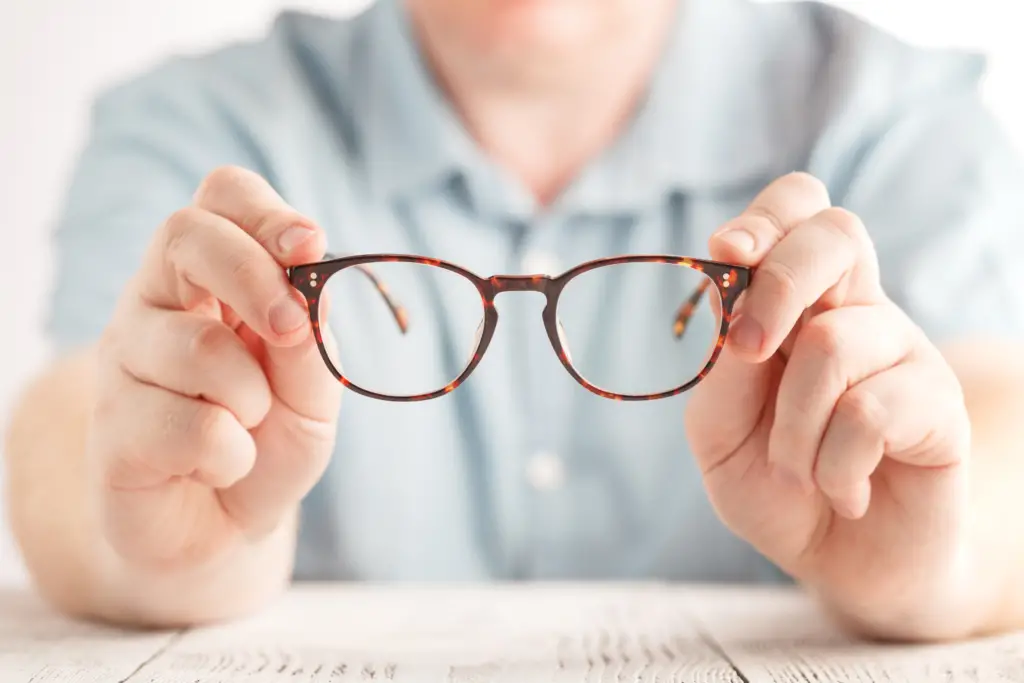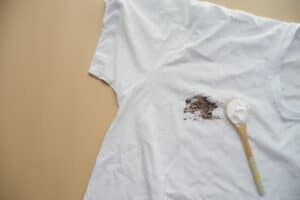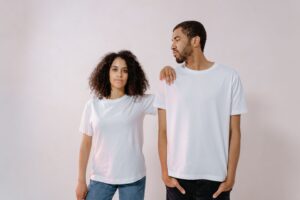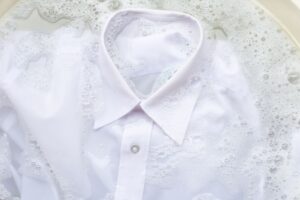7 Sustainable Prescription Eyewear Brands Worth Checking Out

If you are after some blue light glasses to protect your eyes from screen use, I would check out Baxter Blue. They have a range of blue light glasses made using bio-acetate frames (if you want to know more about this material, check out this blog post). Their designs are simple, fuss-free and won’t leave you overwhelmed by too much choice. And they are so reasonably priced at $149 (2024 pricing). Check it out here.
| Brand | Price | Healthcare Rebate | Frame Materials |
|---|---|---|---|
| Good Citizen | $135 - $229 | No | Recycled plastic bottles |
| Ozeano | $199 | No | M49 bio acetate |
| Mari & Clay | $299 | Yes | Bio acetate |
| Dresden | $75 - $250 | Yes | Virgin materials (Nylon) |
| Vilo | $80 - $129 | No | Wood |
| Brambies | $109 - $149 | No | Wood |
| Specsavers Rewear | 2 for $249 | Yes | Partially made from recycled and bio based materials |
- All brands I looked at were Australian owned but there are some really good brands on this list so check them out even if you are not Australian.
- Where I note that the glasses are manufactured overseas, it means outside of Australia.
- In all cases both men’s and women’s styles were available. The majority sold unisex, gender-nonspecific styles.
- In all cases, you will need to know your current prescription. In some cases, you will need to provide your pupillary distance (PD), which you will not find on your prescription. The brands that require this will provide details on how to measure your PD, so don’t worry too much about that.
- They sell readers, polarised prescription and clear prescription lenses, fitted to the frame
- 100% Australian made
- Frames made from 100% recycled plastic bottles
- Hinges are made from the same recycled material
- Modular design so you can customise and repair easily
- Repair service offered
- Takeback service offered
- Basic designs to suit most people
- Packaging made from recycled materials and is recyclable
- Free shipping over $173
- Postage for returned items is covered
- Virtual try-on available on some model
- Carbon-neutral operations
- 4.8 out of 5 based on 21 Facebook reviews
- Bifocal, multifocal and progressive lenses are not available
- Health care rebates not offered
- Not all glasses are available for virtual try-on
- Single prescription and polarised prescription lenses are available, fitted to the frame
- Bifocal and multifocal lenses available on request
- Superhydrophobic, scratch-resistant, anti-reflective lenses
- Frames made from 100% M49 bio acetate
- Top-of-the-range, robust, Italian-made double wire core hinge, complete with Teflon-coated screws to create a hinging system that will last
- Takeback service is offered with a 25% voucher for new purchases
- Basic designs to suit most people
- Virtual try-on available
- Packaging made from recycled materials and is compostable
- Certified B Corp
- 5 out of 5 based on 7 Facebook reviews
- Manufactured overseas
- No repair service for frames
- No free shipping but set at a fixed rate of $10 in Australia and $20 international
- Return shipping at the customer’s expense
- Health care rebates not offered
- Polarised prescription CR39 NuPolar lenses are fitted to the frame
- Anti-scratch lenses
- Heath care rebate offered
- Frames made from 100% bio acetate
- They use high-quality metal hinges that are riveted through the temples and frame fronts to ensure the sturdiest construction
- Lifetime warranty on craftmanship, covering manufacturing defects
- Repair service offered
- Takeback service offered with 25% off the next purchase
- Basic designs to suit most people
- Packaging made from recyclable materials
- Free shipping
- Does not offer clear prescription lenses
- The suppliers of the bio acetate material are not clear. They only note it: “is derived from responsibly harvested cotton seed and wood pulp”.
- Likely manufactured overseas
- Cannot try out the glasses at home or online
- Return shipping at the customer’s expense
- No external reviews could be found
Teaming up with co-founder Jason McDermott, they sought to put the glass wearer at the centre of their businesses. With this approach, they sought to reduce prices, adopt sustainable practices and provide functional, versatile, fun and sturdy glasses with low-cost backups.
Price: $75 – $250
- Single-vision, reading and multifocal lenses are available
- Anti-reflective and anti-scratch lenses
- They only offer one design option however, it is a classic design and comes in four sizes and multiple colours
- Lenses are interchangeable as a result
- Frame fronts and arms are locked together with a plastic pin – so no fiddly screws or tools are needed
- Frames and arms are interchangeable as a result
- 10-year warranty on frames
- Virtual try-on available or try on in store
- Packaging made from recycled materials
- Healthcare rebates are available
- Made in Australia
- Rated 4.4 out of 5 on productreviews.com.au
- Limited design options
- The majority of frames are made from virgin materials. They use a recyclable Swiss nylon called Nylon 12. However, they have experimented with limited-edition glasses made from milk bottle caps, recycled wood chips and beer keg caps.
- No repair service (but there is a no questions asked 10-year warranty)
- No take-back service
- No free shipping but it is a $10 flat rate in Australia and $15 internationally
- Return information could not be found
- FSC-certified laminated wood frames
- Virtual try-on available
- Partial take-back service offered – you can donate old usable frames of any brand and receive 20% off a new Vilo product. The old frames will be donated to those in need.
- Packaging made from bamboo
- Free shipping in Australia and $12 to the rest of the world
- Returns are allowed within 30 days
- You pay for the frames only – the frames are designed so you can easily insert your prescription lenses
- It is not clear how easy it is to insert your lenses
- It is not clear where the wood is sourced from and how the wood is laminated
- Limited design options
- Likely manufactured overseas
- No health care rebate offered
- Warranty limited to 12 months and a 200-day accident cover
- No repair service
- No take-back service exists for damaged products
- It appears return shipping is at the customer’s expense
- No external reviews could be found
Price: $109 – $149
- Frames made from FSC-certified wood
- Free delivery within Australia and $10 elsewhere
- Returns are available within 30 days
- The glasses come with standard blue light filtering lenses so you need to provide the prescription lenses. They are designed with an invisible cut and integrated screw that allows you to replace the lenses however they note on their website that it can be hard to find an optometrist to work with wood frames.
- Appears other materials, like bio acetate and metal, are used in their frames, however, this is not clearly stated on their website
- It is not clear where the material is sourced from
- Likely manufactured overseas
- Limited design range
- Unable to try it on at home or in person
- Health care rebates not offered
- No repair service for frames
- No take-back service offered
- No warranty details
- No information on packaging could be found
- Return shipping appears to be at the customer’s expense
- No external reviews were found
- Frames come with a single-focus lens and it appears you can order bifocals and multifocal lenses. Stores will give you that option.
- Lens features such as polarization, ultraclear, superclean, extra thinning, reactions and ultra drive tint are available (but it does cost extra)
- Frames partially made from recycled and bio-based materials
- Reasonable design range
- Virtual try-on or try on in store
- Free delivery within Australia
- Returns are available within 90 days
- Healthcare rebates are available
- It is not clear what materials are used in the frames and where the material is sourced from
- Likely manufactured overseas
- No repair service for frames
- No take-back service offered
- The warranty is limited to 2 years
- No information on packaging could be found
- Return shipping appears to be at the customer’s expense
- No external reviews for Rewear could be found but Specsavers as a whole has very mixed reviews on Trustpilot – 3.6 out of 5 stars
Related FAQs:
Are glasses sustainable?
What are sustainable glasses made of?
Can glasses be made from recycled plastic?
Can glasses be made from recycled metals?
Are plant-based plastic glasses better for the environment?
Are wooden glasses sustainable?
Which is better plastic or glass lenses?
After more information? You may be interested in....
Don’t Throw Them Away – Practical Uses for Your Old Glasses – if you have old eyewear, don’t trash it! Explore this guide, which covers options to repair, reuse and recycle glasses.
Sustainable Sunglasses – Know What to Look Out For – learn about the different options available to make your sunglass purchase a sustainable one.
9 Sustainable Sunglass Brands Worth Checking Out – for a list of Australian brands making sunglasses from sustainable materials and a summary of the pros and cons of each.
Sustainable Choices for Your Eyewear – Your Options Covered – for information on reusing old frames and lenses and where to get glasses second-hand.
Replacing New Lenses in Your Old Frames – Is it Worth it? – for further information about getting new lenses into your existing frames, in particular, how much this will cost
Plant-Based Sunglasses – What Are They Made From Really? – read this if you want to know what “plant-based” sunglasses really mean and what makes them a sustainable option.
A Close Look At Bamboo Sunglasses – Sustainable or Not? – for a great overview of bamboo as a material source, allowing you to judge whether it is a sustainable option or not.
Recycled Metal Sunglasses – From Waste to Wearable – discover the unusual source materials used in recycled metal sunglasses and the studies that show they are a sustainable option.




